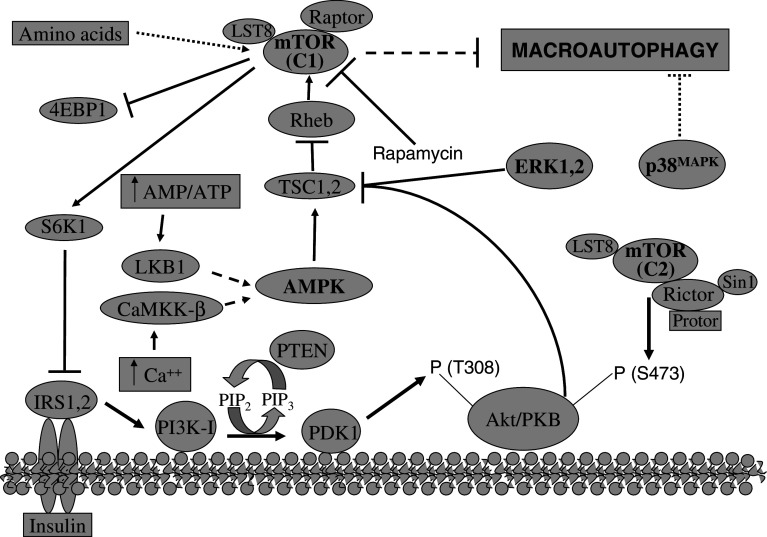Fig. 7.
Macroautophagy is mainly regulated by the TOR signalling pathway. The kinase mammalian TOR (mTOR) is the principal negative regulator of macroautophagy. mTOR exists in two distinct complexes: one which is sensitive to the drug rapamycin (C1) and a second, which is not (C2). Regulatory amino acids activate mTORC1 and, thus, inhibit macroautophagy by a still unknown pathway. Insulin and some growth factors inhibit macroautophagy through the insulin receptors (IRS) and class I PI3K (PI3K–I) that produces phosphatidylinositol 3,4,5-trisphosphate (PIP3). The well-known tumor suppressor phosphatase and tensin homologue (PTEN) antagonizes the activity of PI3K–I by dephosphorylating PIP3 to.phosphatidylinositol 4,5-bisphosphate (PIP2). PIP3 recruits the oncoprotein Akt (also called proteinase kinase B or PKB) to the cytosolic face of the plasma membrane where it is phosphorylated at different residues (T308 and S473) by the 3-phosphoinositide-dependent kinase 1 (PDK1) and the mTORC2 complex, respectively. Akt phosphorylates one member (TSC2) of the tuberous sclerosis complex TSC1 (hamartin), TSC2 (tuberin), which is inhibited. TSC1,2 is a negative regulator with GAP activity of the small GTPase Rheb, which in its GTP-bound form activates mTOR-Raptor, inhibiting macroautophagy. On the other hand, a high AMP/ATP ratio or an increase in cytosolic Ca++ produces, through the serine/threonine protein kinase LKB1 or the Ca++/calmodulin-dependent protein kinase kinase beta (CaMKK-β), respectively, the phosphorylation and the activation of the AMP-activated protein kinase (AMPK), which increases macroautophagy, via TSC1,2. mTORC1 phosphorylates its substrates, including 4EBP1 and S6K1, and rapamycin is a strong and quite specific inhibitor of mTORC1. To prevent the overactivation of the mTOR signalling pathway, S6K1 can phosphorylate the insulin receptor substrate 1 (IRS1), inhibiting in this way the proximal part of the insulin signalling pathway. Finally, other signalling pathways are also known to regulate macroautophagy, including those involving the MAP kinases ERK1,2 (Ras-Raf-MEK-ERK pathway) and the p38MAPK, which activate and inhibit, respectively, macroautophagy. ERK1,2, like Akt, also inhibits TSC1,2, while how p38MAPK inhibits macroautophagy is less known

